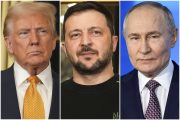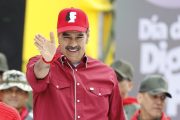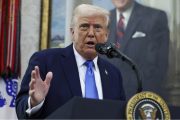
The Peterson Institute for International Economics (PIIE), arguably the premier globalist think tank on trade and economic matters, is holding a conference today to ramp up political and business support for NAFTA, the embattled North American Free Trade Agreement. The conference, entitled “A Positive NAFTA Renegotiation,” which is being webcast from PIIE’s Washington, D.C., headquarters, is the latest in a series of conferences, panels, and publications by PIIE, the Council on Foreign Relations (CFR), the Brookings Institution, the Council of the Americas, and fellow one-worlders to rebuff any attempts by President Donald Trump to undo NAFTA.
Although Candidate Donald Trump threatened to tear up the disastrous agreement, President Trump has been more equivocal, suggesting he intends to renegotiate the deal, but not providing any specifics concerning what that might entail and what the final product may look like. Concerns that a renegotiated NAFTA could be little better (and in some regards actually worse) have been fed by President Trump’s appointment of veteran members of the Council on Foreign Relations (CFR) and other globalist organizations to top posts in the Commerce and State Departments, as well as the tapping of Robert E. Lighthizer (a CFR member) to be U.S. trade representative.
PIIE’s “A Positive NAFTA Renegotiation” conference features top names who have been in the forefront of promoting revolutionary regional “trade” pacts that actually have dangerous sovereignty-destroying “governance components designed into them. Patterned after the European Union, they are designed gradually to usurp power from the member nation states and transfer national and local functions to increasingly empowered regional institutions. PIIE has been the chief strategy center for these schemes, such as NAFTA, the Central American Free Trade Agreement (CAFTA), the Trans-Pacific Partnership (TPP), the Transatlantic Trade and Investment Partnership (TTIP), the Free Trade Area of the Americas (FTAA), the Security and Prosperity Partnership (SPP), the North American Union (NAU), and more.
Leading off the conference is C. Fred Bergsten, PIIE senior fellow and director emeritus. A member of the CFR and the elite Trilateral Commission, Bergsten got his big break as assistant for international economic affairs to Dr. Henry Kissinger at the National Security Council, later rising to assistant secretary for international affairs of the US Treasury (1977–81), and then undersecretary for monetary affairs (1980–81). He currently serves on the U.S. President’s Advisory Committee for Trade Policy and Negotiations.
Other major conference speakers include:
• Gary Clyde Hufbauer (CFR), PIIE Senior Fellow; deputy assistant secretary for international trade and investment policy of the U.S. Treasury under President Carter (1977–79); and Maurice Greenberg chair and director of studies at the Council on Foreign Relations (1996–98).
• Wendy Dobson (Trilateral Commission), professor at the University of Toronto; co-director for the Institute of International Business at the Rotman School of Management; former Canadian associate deputy minister of finance.
• Antonio Ortiz-Mena, a senior advisor at the Albright Stonebridge Group, the global consulting company run by former Secretary of State Madeleine Albright (a director emerita at the CFR, a Trilateral Commission member, and attendee of the ultra-elite, secretive Bilderberg Group).
Additional conference speakers include PIIE authors/scholars Caroline Freund, Jeffrey J. Schott, and Cullen S. Hendrix (PIIE). Martin Walker of the London Observer has said that the PIIE “may be the most influential think-tank on the planet,” with “an extraordinary record in turning ideas into effective policy.” The PIIE website boasts that “Dr. Bergsten was the most widely quoted think-tank economist in the world during 1997–2005 (the latest period for which such data are available). He was cited as #37 of the top 50 ‘Who Really Moves the Markets?’ (Fidelity Investment’s Worth) and as ‘one of the ten people who can change your life’ by USA Today.”
The Peterson Institute for International Economics is named for founder Peter G. Peterson, who is PIIE’s chairman of the board. Peterson was also the longtime chairman of the board of the CFR (1985-2007), following David Rockefeller’s retirement from that position, and has remained as chairman emeritus of the organization since 2007. The Peterson Institute is, in reality, an adjunct of, and transmission belt for, the Council on Foreign Relations and its world government ambitions.
NAFTA Lobby Gears Up
The PIIE conference follows similar high-level events of political and financial elites, such as May 23 conference of the Americas Society/Council of the Americas conference in Mexico City. Videos of the AS/COA conference can be seen here, including remarks by Susan Segal (CFR), president and CEO of AS/COA, an organization founded by David Rockefeller in 1965.
On May 23, the Brookings Institution held a symposium on “Renegotiating the U.S.-Mexico relationship in 2017,” led by Martin S. Indyk (CFR), Brookings executive vice president; and Earl Anthony “Tony” Wayne (CFR), former ambassador of the United States to Mexico. Videos of the symposium can be viewed here. Like the PIIE, Brookings is simply another transmission belt of the CFR globalist viewpoint. Brookings’ president is former Clinton security risk Strobe Talbott (CFR); its co-chairmen are David Rubenstein (CFR vice chairman) and John Thornton (CFR). Its co-vice chairmen are Glenn Hutchins (CFR) and Suzanne Nora Johnson (CFR) — and the board of trustees is filled with still more CFR veterans and votaries.
The NAFTA lobby events cited above follow the May 9 CFR program, “Renegotiating NAFTA,” which featured James M. Lindsay, the CFR’s senior vice president and director of studies, as well as the chair of its Maurice R. Greenberg Center; Robert McMahon, CFR managing editor; Rohinton P. Medhora, president of the Centre for International Governance Innovation (CIGI), a Canadian think tank; and Andres Rozental, president of the Mexican Council on Foreign Relations. A podcast of the event can be accessed here.
Long String of Lies, Broken Promises
The CFR, PIIE, Brookings, AS/COA, and related organizations are setting the stage for another replay of past performances. They have the full lineup of usual “experts” and corporate shills to proclaim the urgent need for, and supposedly wondrous benefits of, a renewed/reformed/rebooted NAFTA.
Thus, it behooves us to repeat a warning in this regard we issued in June of 2015, in the article, “10 Reasons Why You Should Oppose TPP and TTIP.”
We wrote:
As with NAFTA and every other pseudo-free trade agreement, there are many politicians, lobbyists, and think tanks making pie-in-the-sky claims that TPP and TTIP will usher in new prosperity and a wave of good-paying jobs. We’ve been there before. In 1993, the Peterson Institute for International Economics released its influential study, “NAFTA: An Assessment,” which predicted that “with NAFTA, U.S. exports to Mexico will continue to outstrip Mexican exports to the United States, leading to a U.S. trade surplus with Mexico of about $7 (billion) to $9 billion annually by 1995.” It also predicted that the U.S. trade surplus with Mexico would increase to $12 billion annually between 2000 and 2010. The actual result was quite different.
“In 1993, the year before NAFTA went into effect,” we continued, “the United States had a $1.66 billion trade surplus with Mexico; by 1995, the first year after NAFTA had entered into force, that changed to a $15.8 billion deficit. By 2000, that annual deficit had soared to $24.5 billion, and by 2007 it hit $74.7 billion. For 2014, our trade deficit with Mexico dipped to only $53.8 billion. In 1993, the year before NAFTA, we imported around 225,000 cars and trucks from Mexico. By 2005, our imports of Mexican-made vehicles had tripled to 700,000 vehicles annually, and in 2012, Mexico’s export of vehicles to the United States surpassed 1.4 million. Chrysler, Ford, and GM transferred major production facilities (and jobs) from the United States to Mexico. Our trade deficits with Canada have followed a similar path since adoption of NAFTA.”
We further noted: “The PIIE authors and other pseudo-free trade propagandists had cherry-picked data and simply invented statistics to fraudulently sell their product: NAFTA. If they were car salesmen, they would have gone to jail for fraud and misrepresentation. Instead, they are back doing the same thing, concocting rosy statistics to sell the TPP and TTIP.”
The globalist game plan appears to be to rev up the NAFTA lobbying effort to get NAFTA 2.0 negotiated and rammed through Congress before the 2018 congressional elections.
Image of flag: NAFTA logo via wikipedia
Related articles:
North American Union: From NAFTA to the NAU
Obama-Merkel Push TTIP, as Support for Transatlantic Union Tanks
TPP Imposes EU-Style “Commission” on America (Video)
Secret TPP Text Released: GOP to Push Obama’s Dangerous Trade Deal




